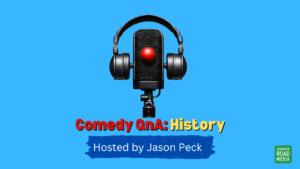An aspect that businesses frequently ignore is having an effective compere at public functions. Compere, MC, Emcee whichever spelling you choose it’s important to have someone who gain capture everybody’s attention. Aside from providing the entertainment through humour, they can also help with the time management of an event. Whether it’s a fundraiser or you’re a red coat Toastmaster at a wedding.
You, the Entertainment
A lot of people forget that a compere is supposed to be an entertainer as well, not just someone who monotonously reads the introductions off 3×5 cue cards. British comedian Mark Lamarr used to a lot of compering in the early part of his career. He told a story once where an audience member approached him and said:
“You’re very good, why don’t you try an get a 5-minute spot at this club”. Not realising that Lamarr had been on and off stage all night, entertaining the audience effortlessly with his off-the-cuff wit.
No matter discipline your MC has as a background, whether it’s a comedian or speaker, they can adapt to the situation at hand. They also have the great ability to do damage control limitation. Apart from the obvious where an MC has to cover for a mistake or something that went wrong, often other acts or speakers just aren’t ready so then the MC has to fill. That’s what can make a person an effective compere at public functions
I compered a charity show once and there was a mini auction with an act that was due to follow. I got told the act wasn’t ready so, thinking on my feet, I went on stage with the auctioneers and chatted to them. I asked how it went, made a few jokes about how auctions work and got the audience to give a round of applause to all those who had donated money. Then I brought on the act and the audience was none-the-wiser for the delay.
Your Friends, the Audience
An MC can also provide breaks for the audience as necessary and take the time to entertain them and hold their attention with a few well-placed jokes, gently poking fun at the event. They can give an event a much needed comic relief.
Introducing Other Speakers
In his book Speech-making and Presentation Made Easy, Max Atkinson says that you can get use a speaker’s name to prompt an audience to applause. You can do it in 4-easy steps:
1. Identify the person being introduced or thanked.
2. Say something about them.
3. PAUSE
4. Name them.
So with the above template filled in here’s an example for you. I’ve kept the numbers in so you can see:
(1) “Our next speaker is Managing Director of Blah, Blah Ltd. (2) He founded that company two years ago when he was £50,000 in debt and now he’s a millionaire. (3) (PAUSE). (4) Michael Rich”. (Applause)
Your Time Management
A good emcee can help to keep an event to time by giving ample warnings to any long-winded speakers. Obviously if someone does overrun you cannot go on stage and berate them, you just have to work out how you can make up time elsewhere in the evening; shorten your links between acts, shorten the break and so on.
If the event is divided in half, with an interval, I personally don’t like to do longer than 5 or 10 minutes at the beginning of each half. The show’s not about me it’s about all the other acts. So I like to connect with the audience, entertain them and then bring on the next speaker or act.
I also tend not to do too much material in-between each act as that can add time on to the event. By keeping my opening short and can help manage the time if someone is late, or delayed for some reason. Then it’s your job to be able to cover up.
A good training ground for being an MC is being Toastmaster at a Toastmaster International club meeting. They are responsible for the smooth running of the evening and a brilliant Toastmaster can make it seem easy. Believe me it’s not. I remember the first time I did it thinking, “how come this is so hard?”
So if you’re already a member of Toastmasters, then get yourself signed up for the Toastmasters role as often as possible.
If you’re of a comedic persuasion, and guessing by the fact that you’re reading this on this blog you are, I would start making the rounds of comedy clubs too. Develop a 5-minute set and see if you can get some MC work too. It might not pay very much, if at all, in the beginning but at this stage its about learning the process and gaining audience time.
It’s not the end of the world if you don’t try your hand at stand-up, it’s just another avenue that you can try. But I would certainly get yourself along to a Toastmasters club meeting and get yourself involved. Event managers will eventually turn to you when they’re looking for an effective compere at their public functions.
If you don’t have a copy of Max Atkinson’s book, I thoroughly recommend it. You can get a copy from this link: Speech-making and Presentation Made Easy: Seven Essential Steps to Success
Note: There are affiliate links on this page. That means that if I make a purchase via my link, I get paid a commission. It helps me pay the bills.



